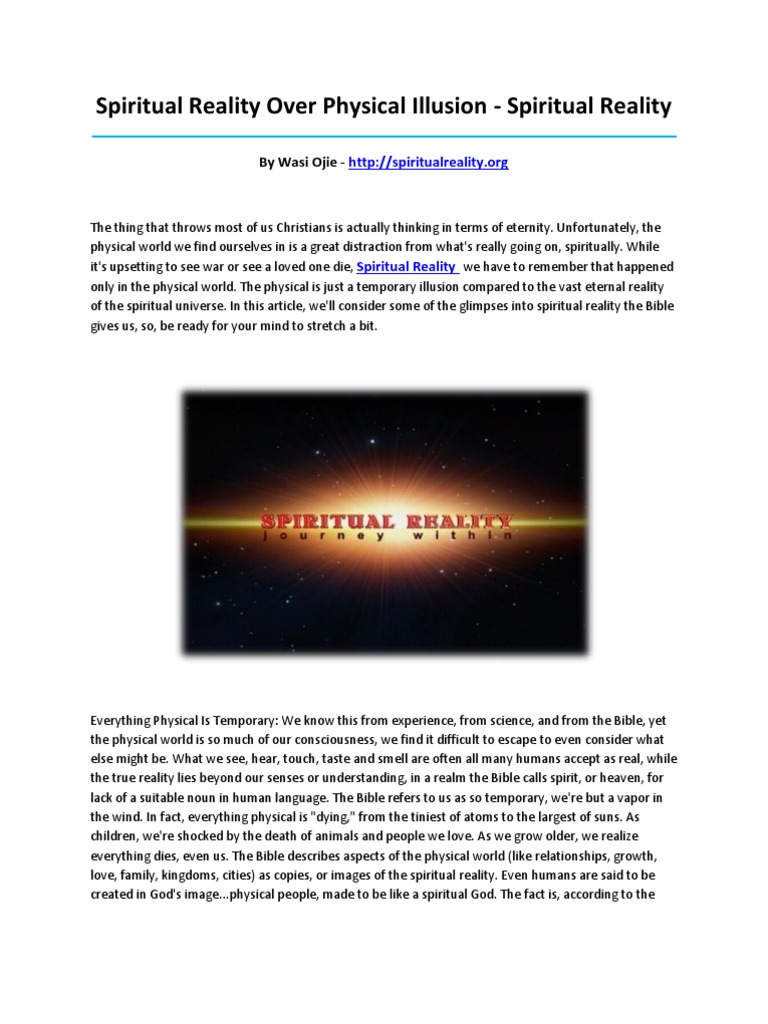Baha’i teachings present a profound exploration of the concept of spiritual reality, inviting adherents and seekers alike to delve into a sublime understanding of existence. The teachings of Baha’u’llah, the founder of the Baha’i Faith, emphasize a unity that transcends physical boundaries and societal divisions, beckoning us toward a deeper appreciation of our interconnectedness and the divine. Understanding what constitutes real spiritual reality not only satisfies an innate curiosity but also reveals the intricate tapestry of life woven through divine knowledge and purpose.
The Quest for Understanding Spiritual Reality
Spiritual reality, within the context of Baha’i teachings, is not merely a juxtaposition against the physical or material world. It encapsulates a transcendent essence that underlies all existence. Often, individuals may observe the material world with a sense of wonder, captivated by its beauty and complexity. Yet, this fascination hints at a deeper inclination—an innate yearning to connect with something greater than oneself, a source of sacred truth that pervades the cosmos.
The Baha’i perspective posits that spiritual reality is the bedrock of all creation. While the physical world is subject to change and impermanence, spiritual reality remains constant, reflecting the immutable qualities of the divine. It prompts an exploration into the nature of existence itself, urging individuals to seek beyond superficial layers and engage with the underlying principles that govern human experience.
The Relationship Between Material and Spiritual Worlds
In Baha’i philosophy, the material and spiritual worlds are not dichotomous; rather, they exist in a harmonious relationship, each informing and enriching the understanding of the other. The material world serves as an arena for spiritual development—a realm where individuals can cultivate virtues, exercise free will, and manifest the higher qualities instilled within them.
The teachings articulate that recognizing the interconnectedness of these realms is crucial to grasping spiritual reality. Material phenomena, while transient, are imbued with significance that points to higher spiritual truths. For instance, the changing seasons and the rise and fall of empires may reflect broader cycles of spiritual awakening and decline, suggesting a continuous evolution toward a more profound state of awareness.
The Nature of the Divine
At the heart of Baha’i teachings is the concept of God as the ultimate source of spiritual reality. God is described as the “Invisible Essence,” transcendent and unknowable in His essence, yet manifest in the myriad ways through His creations. This duality invites individuals to reflect upon their relationship with the divine—encouraging a personal and intimate understanding rather than a dogmatic adherence.
Baha’is believe that God reveals His attributes progressively through a series of prophets, each of whom brings messages tailored to meet the needs of humanity at different times. This progressive revelation is a testament to the ever-evolving nature of spiritual truth, suggesting that while the essence of spiritual reality remains constant, our comprehension of it may expand and deepen in response to divine guidance.
Developing Spiritual Insight
To engage meaningfully with the notion of spiritual reality, individuals must cultivate spiritual insight. This process is integral to Baha’i practice, which emphasizes prayer, meditation, and the application of spiritual principles in daily life. By engaging in these practices, individuals learn to discern the spiritual lessons embedded in their experiences, fostering a deeper connection with their true selves and the collective human spirit.
Moreover, cultivating virtues such as kindness, compassion, and justice aligns one’s actions with the divine will, facilitating a manifestation of spiritual reality in the material world. This relationship highlights the importance of living a life that is reflective of spiritual truths—an endeavor that not only enriches personal life but also contributes to the upliftment of society.
The Role of Community in Spiritual Understanding
The Baha’i Community embodies the principles of unity and diversity, where individuals gather to reflect on spiritual reality collectively. Community life serves as a crucible for growth, where varying backgrounds and experiences converge to create a rich tapestry of understanding. This collaborative exploration fosters an environment conducive to spiritual insights, revealing the multifaceted dimensions of divine wisdom.
Moreover, the emphasis on service to humanity is a reflection of the understanding that true spiritual reality is intimately connected with the betterment of society. Acts of service not only contribute to collective well-being but also serve to elevate individual spiritual consciousness by embodying the teachings of Baha’u’llah in tangible ways.
Conclusion: Embracing Spiritual Reality
The pursuit of understanding spiritual reality is not merely an intellectual exercise but a transformative journey that engenders personal growth and communal harmony. Baha’i teachings invite individuals to transcend the ordinary confines of existence by recognizing the profound interconnections that define our lives. This invitation extends to all of humanity—a call to embrace the shared spiritual heritage that binds us together, nurturing a world that reflects the beauty and unity inherent in divine creation.
As one contemplates the nature of spiritual reality, it becomes evident that this exploration leads to enlightenment and fulfillment, guiding seekers along the path of service and spiritual development. In the end, Baha’i teachings encapsulate the essence of humanity’s quest for meaning, urging individuals to delve into spiritual reality and experience the divine interconnections that lie at the heart of existence.
